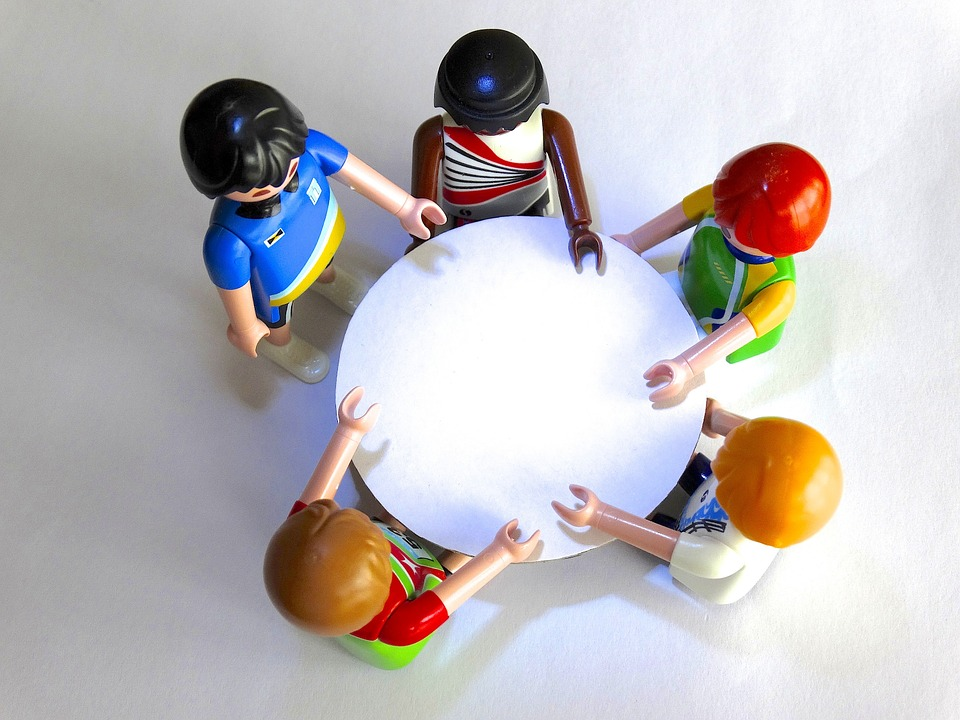Looking for a way to connect with peers? Roundtables might be the answer. What’s a roundtable? Back in June of 2020, my colleague Paula Newcom wrote a very thorough article answering this question, so I’ll just give you the CliffsNotes version: Roundtables are a chance for peers to gather and to discuss, share and troubleshoot issues they may encounter in their jobs. Called “counterparts” in the Northwest area of the state, these library staff led and organized gatherings are a grassroots way to connect and learn from others in similar jobs. They can be in-person, with regional groups meeting at area libraries, or they can be virtual, utilizing virtual meeting software like Zoom. A few have even begun offering a hybrid of in-person and virtual, although this is not yet common.
 Pre-pandemic, Indiana had a relatively robust network of roundtables that met, usually in person, several times a year. While some of those transitioned to virtual and then back to in-person successfully, others seemed to come to a halt, especially with staffing changes, shortages and turnover during these tumultuous years. Recently, I’ve heard a number of people say they wish a roundtable would start in their area. For them, I have excellent news: Anyone can start a roundtable!
Pre-pandemic, Indiana had a relatively robust network of roundtables that met, usually in person, several times a year. While some of those transitioned to virtual and then back to in-person successfully, others seemed to come to a halt, especially with staffing changes, shortages and turnover during these tumultuous years. Recently, I’ve heard a number of people say they wish a roundtable would start in their area. For them, I have excellent news: Anyone can start a roundtable!
While Indiana State Library Professional Development Office staff are happy to support roundtables by attending and even occasionally presenting when available, roundtables are not typically organized by State Library staff, with a few exceptions. Rather, we encourage library staff to start and maintain them. Any library staff member – with permission from their supervisor, of course – can reach out to neighboring libraries or send a callout email to the Listservs, inviting them to meet for a few hours to discuss a relevant topic.
If you’re interested in starting a roundtable on a particular topic in your area, here are some recommended steps:
- Make sure your supervisor is okay with you organizing a roundtable.
- Email the Listservs – depending on the topic you hope to discuss – asking whether a group in your area already exists; if not, have people contact you directly if they are interested in meeting.
- Optional: Gather a list of libraries near you – 30-60 minutes away – and email relevant staff directly to invite them to form a roundtable. Many libraries have staff directories on their websites.
- Once you have interested parties, determine who will host the first meeting, and when. Who has a meeting room and when is it available? Typically, roundtables meet for approximately two hours on a morning, but your group can meet whenever works for the majority!
- Once your date/time/location are set, email the interested group with the details. You should also consider emailing the relevant listservs once again, this time with the details as an open invitation. Consider contacting either the Indiana State Library’s Children’s Consultant or your Indiana State Library Regional Coordinator to invite them to attend if they’re available.
- Determine who would like to be the “leader” of the first meeting. This is often the host library staff, but could be the person who has organized the whole thing. It doesn’t have to be the same person every time, although having one person “in charge” of setting meeting dates can be very helpful.
- For the very first meeting, the “leader” should consider developing a loose list of questions to keep the conversation going. Roundtables are very informal discussions, but it’s good to have a few specific topics in mind. For subsequent meetings, the group can work together to decide discussion topics.
- Meet! Discuss! Share! Problem solve! Commiserate! Encourage!
- If you haven’t already, be sure to gather everyone’s information – name, library, and email address – before ending the meeting so you can easily set up the next one.
- After the meeting, the host library can issue an LEU certificate for a maximum of one LEU to attendees following the LEU policy for Professional Roundtable Meetings. Individual attendees should be mindful that they can only claim up to 10 roundtable LEUs per five year certification period, although you can certainly attend more than ten!
 Of course, recognizing that desk schedules are tight at many libraries right now, virtual roundtables are still an option. Virtual may also work better with some smaller groups that would benefit from statewide participation in one group, rather than multiple smaller groups across the state. The general steps are the same, with a few exceptions:
Of course, recognizing that desk schedules are tight at many libraries right now, virtual roundtables are still an option. Virtual may also work better with some smaller groups that would benefit from statewide participation in one group, rather than multiple smaller groups across the state. The general steps are the same, with a few exceptions:
- The host should be able to provide an online meeting platform (Zoom, Teams, etc.).
- Participants should ideally have cameras and microphones to be able to fully participate.
- Participants should clearly understand that the roundtable is only helpful if all participants are actively engaged and share. Even those without microphones should come prepared to share via chat.
Now, go forth and learn from your peers. Good luck!
This blog post was written by Beth Yates, children’s consultant for the Indiana State Library.




